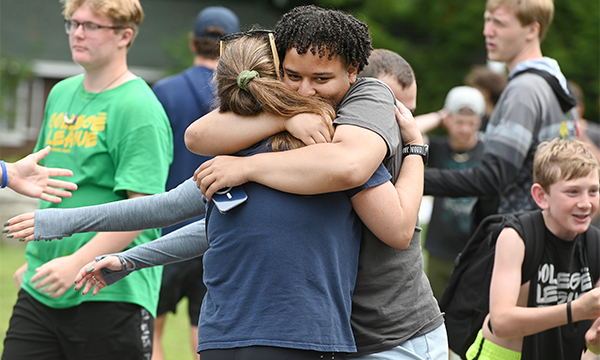Home > How to Be Grief-SMART for Young People
How to Be Grief-SMART for Young People
by Michelle Cove, director of communication, Experience Camps

We are a culture that has long struggled to figure out how to talk openly about grief and show up for one another while it’s happening. People who have experienced grief know this all too well, and research backs it up. Based on a recent Harris poll conducted with Experience Camps for grieving children: While 89% of Americans agree that everyone should learn to talk about grief, only 30% say they know what to do or say when someone is grieving.
That’s a problem. Especially since every single one of us will experience the grief that comes from the death of someone close to us. It is unavoidable.
And it’s most definitely a huge problem for the 6 million kids who will experience the death of a parent or sibling by the time they’re 18. As the director of communications and a volunteer camp counselor at Experience Camps, I hear firsthand from young people how lonely and isolated they feel in their grief. For doulas who may be supporting those with children, understanding some basic facts about grief and young people is important.
We are a culture that has long struggled to figure out how to talk openly about grief and show up for one another while it’s happening. People who have experienced grief know this all too well, and research backs it up. Based on a recent Harris poll conducted with Experience Camps for grieving children: While 89% of Americans agree that everyone should learn to talk about grief, only 30% say they know what to do or say when someone is grieving.
That’s a problem. Especially since every single one of us will experience the grief that comes from the death of someone close to us. It is unavoidable.
And it’s most definitely a huge problem for the 6 million kids who will experience the death of a parent or sibling by the time they’re 18. As the director of communications and a volunteer camp counselor at Experience Camps, I hear firsthand from young people how lonely and isolated they feel in their grief. For doulas who may be supporting those with children, understanding some basic facts about grief and young people is important.

Most of the kids and teens feel their grief makes them the “weird kid” at school. Many of them stop getting invited to parties and playdates because it is assumed they want to be left alone (they typically don’t). A surprising number have shared that they are bullied at school because they are grieving a death and different from others.
Grieving adults, of course, also experience these feelings of isolation, loneliness, and frustration. The reality is that many people are so scared of saying the wrong thing about a death to the griever that they end up saying nothing. Or they say platitudes that many of us have been taught to say, like “I’m so sorry for your loss.”
Over and over, the kids and teens in our community tell us that hearing this is not helpful and can even feel dismissive. As one camper put it, “It’s like something you say just to prove you’re a caring person. It allows you to check a box saying you were supportive and move on, while I’m left alone to deal with my sadness.”
Truly being there for young people who are grieving means going much deeper—being in the discomfort of heavy feelings and expressing empathy without trying to fix anything.
So how do we do that exactly? We get grief-smart. Below are five ways we do this—while making a meaningful difference in the lives of grieving people of all ages.
What It Means to to Be “Grief-SMART”
Say the name.
Make no assumptions.
Ask for stories.
Reach out.
Talk less.
- Say the name. When people are with someone grieving, they tend to get very nervous about bringing up the person who died. The thinking is, “If I bring up the person who died, I’ll make the griever suddenly remember the death and be sad.” People in grief are already feeling sad. Their person died. Most grievers will tell you that hearing the person’s name is actually comforting because it means the deceased hasn’t been long forgotten by others.
- Make space. When you ask people who are grieving how they are feeling, they may tell you they feel sad or heartbroken, as expected. However, grief can bring up many feelings, including anger, relief, and even hope. Perhaps it was getting to be too much to watch their person suffer before death, or it could be that they had a stressful relationship with the person who died. Accept that grieving people have many feelings, sometimes conflicting, and we can help make space for all of them.
- Ask for stories. Our young people often tell us that one of the most painful parts of experiencing the death of their person is that there will be no new stories about them. So it often feels really good for them to share stories they do have. It can also be a wonderful gift to share your own tales of the person who died. Start by asking if they’d like to hear a story, so they have a choice in the matter.
- Reach out. Too often we hear that friends, families, peers, and colleagues stop checking in with grieving people within the first three months of the death. Sometimes it’s even just days after the funeral. Grief changes, but it does not go away. So keep checking in with the person grieving months after the initial mourning (stick a reminder in your calendar) and during milestones and holidays.
- Talk less. One of the reasons people sometimes stop reaching out is that they don’t know what to say or how to make the griever less sad. You can’t make the person not be sad. And you can’t solve anything; there’s nothing to fix. The best way to be there for the person grieving is to ask them how they are doing and just listen. That’s it.
What It Means to to Be “Grief-SMART”
Say the name.
Make no assumptions.
Ask for stories.
Reach out.
Talk less.
- Say the name. When people are with someone grieving, they tend to get very nervous about bringing up the person who died. The thinking is, “If I bring up the person who died, I’ll make the griever suddenly remember the death and be sad.” People in grief are already feeling sad. Their person died. Most grievers will tell you that hearing the person’s name is actually comforting because it means the deceased hasn’t been long forgotten by others.
- Make space. When you ask people who are grieving how they are feeling, they may tell you they feel sad or heartbroken, as expected. However, grief can bring up many feelings, including anger, relief, and even hope. Perhaps it was getting to be too much to watch their person suffer before death, or it could be that they had a stressful relationship with the person who died. Accept that grieving people have many feelings, sometimes conflicting, and we can help make space for all of them.
- Ask for stories. Our young people often tell us that one of the most painful parts of experiencing the death of their person is that there will be no new stories about them. So it often feels really good for them to share stories they do have. It can also be a wonderful gift to share your own tales of the person who died. Start by asking if they’d like to hear a story, so they have a choice in the matter.
- Reach out. Too often we hear that friends, families, peers, and colleagues stop checking in with grieving people within the first three months of the death. Sometimes it’s even just days after the funeral. Grief changes, but it does not go away. So keep checking in with the person grieving months after the initial mourning (stick a reminder in your calendar) and during milestones and holidays.
- Talk less. One of the reasons people sometimes stop reaching out is that they don’t know what to say or how to make the griever less sad. You can’t make the person not be sad. And you can’t solve anything; there’s nothing to fix. The best way to be there for the person grieving is to ask them how they are doing and just listen. That’s it.
Doulas can help make young people’s grief less lonely and isolating by referring clients to a grief-SMART support network.
Experience Camps is an award-winning national nonprofit that transforms the lives of grieving children through summer camp programs and innovative, year-round initiatives. Through compassion, connection, and play, we allow grieving children to embody a life full of hope and possibility. By amplifying their voices, we are creating a more grief-sensitive culture.

